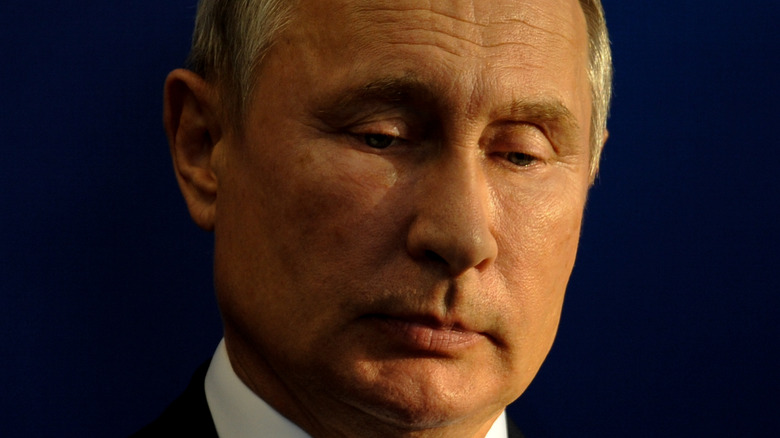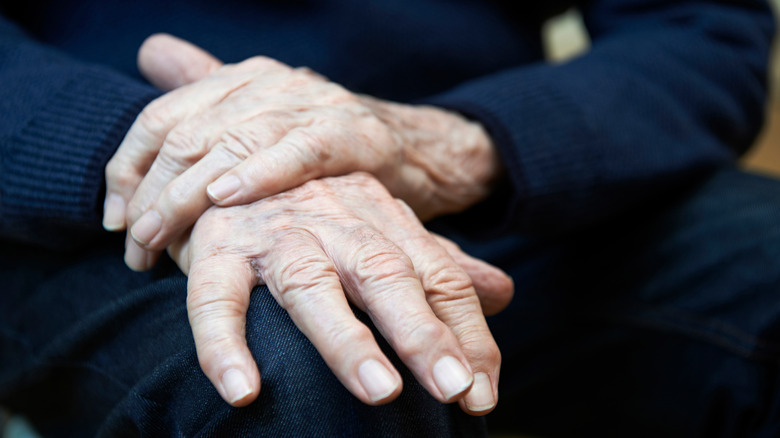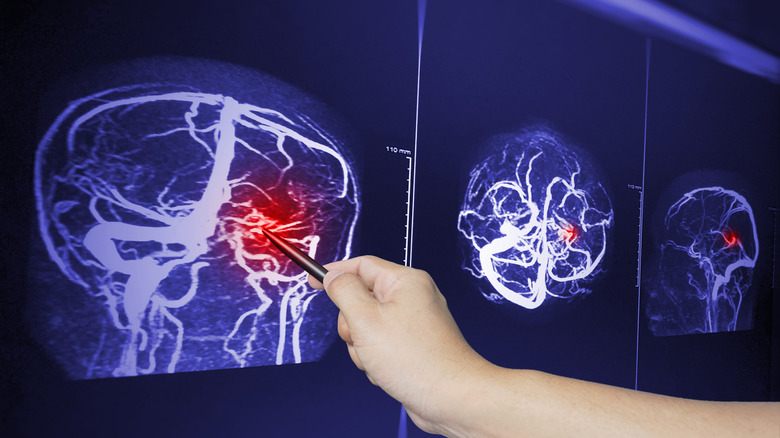Why Everyone Is Talking About Vladimir Putin's Health
Russian President Vladimir Putin has once again made headlines following his appearance at an Orthodox Easter church service in Moscow. Two of Putin's marquee characteristics — his uncanny stillness and bored death stare — weren't exactly on display during the service. As the NY Post reports, Putin was unusually fidgety during the service, twitching around a bit, biting his lips, looking enervated, and generally seeming distracted. Such out-of-character behavior has added new fuel to persistent, and for Ukrainian people doubtlessly hopeful, rumors about the Russian president's declining health.
There are a few possible theories about his behavior. Folks have been speculating about Putin's health ever since he appeared "bloated" in his initial announcement video regarding the war in Ukraine. Granted, Putin is currently 69 years old, so it stands to reason that he'd put on a bit of girth since his shirtless horseback-riding years. Sites like Daily Mail, though, cite a slew of possibilities, from steroid treatments leading to "roid rage" to cancer and Parkinson's disease as possible culprits.
For years now, reports have been milling around the intelligence community about an "identifiable change in [Putin's] decision-making," including reduced "cogency and clarity" and "increasingly erratic" behavior. This was the case even before Putin launched his war with Ukraine. If Putin indeed has been sick, it is possible he might only be getting worse.
Antsy pants during Sunday church
The church service that gave rise to the renewed interest in Putin's health was an annual midnight mass in celebration of Easter at Moscow's Christ the Savior Cathedral (via The Sun). Putin took part in the ceremony by standing off to the side and holding a tall red candle, crossing himself, and so on, along with Moscow mayor Sergei Sobyanin. News outlets immediately jumped on a host of odd, little micro-gestures that Putin exhibited during the mass, leading to descriptions like "unsteady," "distracted," and "frail-looking" heaped upon existing adjectives like "ashen" and "bloated" (via Daily Mail).
On one hand, it makes sense that folks around the world would luxuriate in any and all opportunities to dent Putin's armor. The preoccupation with tiny movements of the body, though, does come across as a bit obsessive and overblown, even if it's quite unusual for the typically impassive Putin. Some have even suggested (of course) that the whole thing was staged, fake, or that the pictures and footage from this year's mass were dupes from last year's. Would-be online sleuths cite things like Putin's similarity of clothing, down to the shade of his tie (via The Scottish Sun).
On the other hand, this incident isn't standalone. During a recent interview with Russian defense minister Sergei Shoigu, Putin appears disturbingly rigid while clutching a table, seemingly for dear life, and exhibiting uncontrolled leg spasms (as seen on Twitter). All in all, this had led many to one, specific diagnosis: Parkinson's disease.
Evidence of Parkinson's disease
Parkinson's disease is a debilitating disorder stemming from the deterioration of the brain's neurons. As Mayo Clinic overviews, many of the symptoms of Parkinson's seem to line up with Vladimir Putin's recent behavioral abnormalities: tremors of the limbs combined with stiff muscles, impaired posture and slowed movement, slurred speech, and the emergence of uncontrolled bodily ticks and twitches. Basically, Parkinson's affects the entire musculature of the body, which also creates incontinence and constipation, sleep disorders, and difficulties chewing and swallowing.
Parkinson's also affects the mind and results in difficulty thinking and concentrating, unstable emotions, depression, and more. As is often the case with life-changing diagnoses, some of these effects are not direct symptoms of Parkinson's disease, but the result of receiving the diagnosis itself. As the Parkinson's Foundation explains, treatment for Parkinson's varies from person to person, and includes drugs, surgery, and exercise regimens. There is, however, no cure. At present, about 10 million people worldwide have the disease (via the Parkinson's Foundation).
Parkinson's often develops naturally as someone gets older (idiopathic Parkinson's), but it can also be drug-induced, meaning that it's caused by drug treatments for some other disorder. Schizophrenia and dementia, for instance, are often treated using antipsychotic drugs that reduce the amount of dopamine in the body. This can create "Drug-induced Parkinsonism," which accounts for about 7% of all Parkinson's onset (via the Parkinson's Disease Society). Some have therefore suggested that Putin's Parkinson's developed from unspecified, earlier dementia.
Vascular dementia and a stroke
To be specific, Parkinson's is a type of dementia, like Alzheimer's. "Dementia" is a larger, general term for a category of degenerative neurological disorders that can splinter off into "Parkinson's disease dementia" (PDD), the official name for Parkinson's (via the Parkinson's Foundation). Folks often receive a diagnosis of "Dementia with Lewy Bodies" (DLB) on the way to developing full-blown Parkinson's, typically from 50 years old on, as the National Institute of Aging (NIA) explains. Lewy bodies are abnormal clumps of a protein called alpha-synuclein that build up in the brain. They cause all of the movement and emotional issues we associate with Parkinson's — and have also seen in Putin.
Numerous people have taken up the "Putin has Parkinson's" banner, but as Newsweek describes, one nurse goes one step further. This nurse, who works with Parkinson's patients, posted a video on TikTok describing evidence not only of Parkinson's in Putin — but of Putin having had a stroke. The nurse points out Putin's "jerking lifting" motion of the legs, which indicates the greater possibility of vascular dementia. Vascular dementia can result from a stroke, or develop in tandem with one, and is caused by reduced blood flow to the brain associated with the same type of reasoning and judgment problems created by Parkinson's (via Mayo Clinic).
Those who commented on the nurse's video largely corroborated it and described similar things happening to family members. Relatedly, those with dementia typically develop ways of hiding their disorder.
Secret doctor's visits and literal blood baths?
From here we veer towards hearsay, speculation, and the blatantly bizarre — and none of this can be confirmed. Deductions about Parkinson's disease, vascular dementia, and strokes seem fairly reasonable based on observable evidence. But Putin bathing in blood extracted from severed deer antlers? Not so much. But if Russian outlet Proekt is to be believed, however, that is what Putin has been up to in his vie to cure himself of nothing less than terminal cancer.
Proekt, which if legitimate needs to be credited with some serious (and seriously risky) investigative journalism, states that Putin has visited with doctors a stunning amount of times over the recent years. He visited with oncologist and surgeon Evgeny Selivanov 35 times over 4 years, and Selivanov stayed with Putin side-by-side for a total of 166 days over that period. Putin also met with otolaryngologists Igor Esakov and Alexey Shcheglov, the latter of which he saw 59 times and who stayed with Putin for 282 days. Consultations with these doctors, Proekt concludes, points to nothing less than thyroid problems. By extension, we're talking cancer.
Proekt also, as sites like Insider reported, discusses reports of Putin taking to, shall we say, "alternative medicine" for his health woes. Now defense minister Sergei Shoigu, once-head of the Ministry of Emergency Situations, apparently convinced Putin in the mid-2000s of the health benefits of bathing in the blood drained from the antlers of Altai stags. There are also indications that Russian elites, on a whole, have allegedly taken to the hobby.
Swelling from steroids and cancer treatment
And so we come to final piece of the Putin health puzzle: his bloat. The Daily Mail cites the connection between throat and face puffiness and steroid use as related to a potential cancer diagnosis. As the National Library of Medicine says, steroids are indeed prescribed as part of treatments for thyroid nodules and lymphoma (which can spread from the thyroid).
The MD Anderson Center further explains that steroids are also prescribed to decrease nausea and vomiting associated with chemotherapy. Steroid treatment can generate mental instability, agitation, confusion, and highs called "steroid psychosis." These symptoms dovetail with the cognitive difficulties present in Parkinson's patients (via Mayo Clinic). Steroid use can also cause increased appetite, weight gain, and yes, swelling, especially in the face and legs. This typically happens if steroids have already been administered for a long time.
Barring direct statements from the Kremlin, it's easy to compose a portrait of what's allegedly been going on with Putin: He's been meeting with doctors for thyroid problems, possibly cancer, and been taking steroids that have started producing some ill effects. At the same time, he either had a stroke that resulted in vascular dementia related to the onset of Parkinson's, or developed Parkinson's and then started taking antipsychotics that exacerbated his mental instability.
If Putin's health really is deteriorating, then his odd behavior in church is just a glimpse of what's to come. If so, there is a potential for an even worse cocktail of disaster on our hands.





